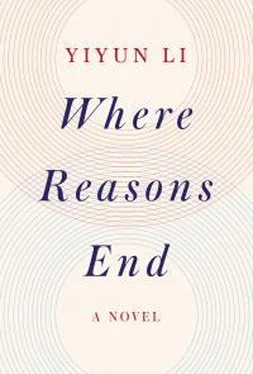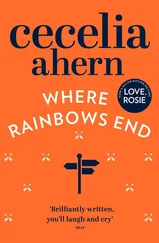Oh gosh, he said. I remember that. Back then I thought a book had to have a title of some number of years of something, he said. All because of A Thousand Years of Good Prayers.
Sixty years of Nikolai, I thought. We only had sixteen of those sixty years. I was feeling sentimental. Numbers made me sentimental. Calendars made me sentimental. Things made me sentimental: a pair of sprinting spikes, a tennis racquet, sheet music on the music stand, a small acrylic painting of California golden poppies, a stuffed baby giraffe that had lost all its filling—I had sewn the tear back together but the giraffe remained skinny and floppy—a handmade print of a purple penguin with a bowler hat. Time made me sentimental: days and nights, minutes and hours, moments that threaten to become eternity.
What happens to sentimental when you take time out of it? Nikolai asked.
What?
You are left with gibberish.
What? I said. I was dense. Once Nikolai told me that J. had made an insulting joke about me: Mommy, you’re dense. You’re so dense if we put you next to a black hole, the black hole wouldn’t suck you in but would be sucked in by you.
The word, Nikolai said. Did you notice time is in the middle of sentimental ?
I looked up both words. Etymologically it means nothing, I said.
What an inelastic mind you have, he said. Do you really have to make this memory book? I can already see its quality. Embarrassing. Humiliating. Mortifying.
You could’ve written that book so much better, but I did not say it. There were many could’ves at this moment. I could go down any one of them like a path that led to nowhere, only to end up somewhere between doubt and regret. It was the maze I had decided not to set foot in. I would rather be here, hovering at the entrance, feeling and resisting the temptation of self-indulgence.
How I hate that word, self-indulgence, Nikolai said.
But I don’t mean you. I’ve never called anyone self-indulgent but myself.
Isn’t that a kind of self-indulgence, too?
Finding a self by negative traits is better than not having a solid self.
Even if the negative traits are imaginary?
Imagination is a kite flown by reality, I said. Imagination doesn’t stand a chance if you cut the line held by reality.
Lofty, he said. Is that your secret?
My secret of what?
Of being you?
Do you mean being me as your mother, or being me, myself?
So there is a difference, he said. I often wondered.
One can stop being a parent or a child, a friend or an enemy, one can stop being alive, but one’s self does not stop being itself. Even death cannot change that. Death takes so many things away from us, but not that. Death is not invincible.
Are we not taking this self too seriously? Nikolai asked.
Of course we are, I said. We take it so seriously that even death, facing that self, pales.
How I hate this self, he said.
But you have a self that is…what is the adjective I should use? I said. Anything I could say would be a cliché.
Now is the time we have to be exact with verb tenses. Do I have a self? Did I? Will I?
A self is timeless, I said. Tenseless.
But it’s flawed.
Tell me one person whose self is not flawed.
It doesn’t work that way, Mommy. You know it doesn’t.
You cannot demand that everyone be perfect.
I can forgive everyone, he said, for being imperfect.
But not yourself.
I tried, Mommy, I did try. Can’t you see I’m perfect in only one way?
Perfect. Imperfect. A pair of adjectives that come over and again, in all seasons, day in and day out, taunting us, judging us, isolating us, turning our isolation into illness. Is there a more accomplished adjective than perfect? Perfect is free from comparison, perfect rejects superlative. We can always be good, do better, try our best, but how perfect can we be before we can love ourselves and let others love us? And who, my dear child, has taken the word lovable out of your dictionary and mine, and replaced it with perfect?
I wish you had made me an enemy, I said, rather than yourself. Mothers, I thought, would be perfect for that role.
You can’t be that for me, Mommy, Nikolai said. I’ve found a perfect enemy in myself.
9
Forever
I went to the car dealer today.
Did you say something? Nikolai said.
It was three o’clock in the afternoon, the most difficult time of the day. I was waiting for Nikolai’s brother to come out of school. It took willpower not to turn around and look in the direction from which Nikolai would have walked toward me. I had willpower, but not enough at three o’clock in the afternoon. I waited in the middle of the block as though they would still have walked equal distances to reach me.
No, I didn’t say anything, I replied. I was aware that I had been thinking of telling him about the car dealer. I had stopped right before the words had slipped out. It would have been small talk in another life but would not be the right conversation now. I did not want to become the kind of person recounting trifles to the dead.
We solved a mystery today, I said instead. Ever since we had moved into the house I had noticed a noise, rhythmic, seemingly coming from inside the house. I had thought it was a broken part of the heater. It turned out that a cardinal made a game of knocking on the basement window, knock knock, knock knock, with a tenacity. I’ve also seen it on the porch, I said. It’s mesmerized by windows.
All birds are, he said.
But this one is persistent, I said. I wonder why.
I was still talking about trifles, but a befuddled and befuddling cardinal was more interesting than the car dealer.
It’s just a bird, he said.
And a window, and a house, and a season, I said.
For sure you’re not a connoisseur of nouns, he said.
A life’s story can be told by the simplest nouns, I said. When I had first arrived in America, I would only buy white bread that was nineteen cents a bag. The next year, we upgraded the bread to twenty-nine cents a bag, and then forty-nine, sixty-nine, eighty-nine, until we had Nikolai and started to buy white bread at a dollar forty-nine a bag. I had never told him about the bread, or so many other stories. I had been cautious with the past, and wanted my children to live in a world where their parents’ stories were boxed up and, if possible, sealed permanently.
Give me one example, he said.
Blueberries, I said. The first time we bought a six-ounce carton of blueberries, when you were three, it felt prodigal.
It’s the adjective prodigal that tells the story, he said, not blueberries.
But prodigal wouldn’t give me back memories of Nikolai as blueberries would. The summer before he had turned four, we had moved across the country to California, into a Spanish-style house on a college campus, with whitewashed walls, red roof, and a path in front of its picture windows, lined with eucalyptus trees. One day Nikolai and his babysitter took a walk and encountered a blueberry bush near the house. He picked some unripe blueberries, ate them, and ran all the way home, screaming and calling the blueberries ferocious.
I remember that, he said. I remember feeling smug because I knew the babysitter, what’s her name, was impressed.
She also told me you called a tree theatrical, I said. How you do love your adjectives.
Yes, more than my blueberries, he said.
Is that possible? I asked. I had often joked that what other children his age spent on smartphones and games and outfits he had spent on blueberries. We used to store cartons of blueberries in the refrigerator and, when they were out of season, bags of frozen blueberries in the freezer. He ate his blueberries in a Little Prince mug I had bought for him in Paris, with a tiny silver spoon. No adjective could describe the mug, the spoon, and the last bag of frozen blueberries that we could not touch now. How long does it take for the frozen to become fossil?
Читать дальше












